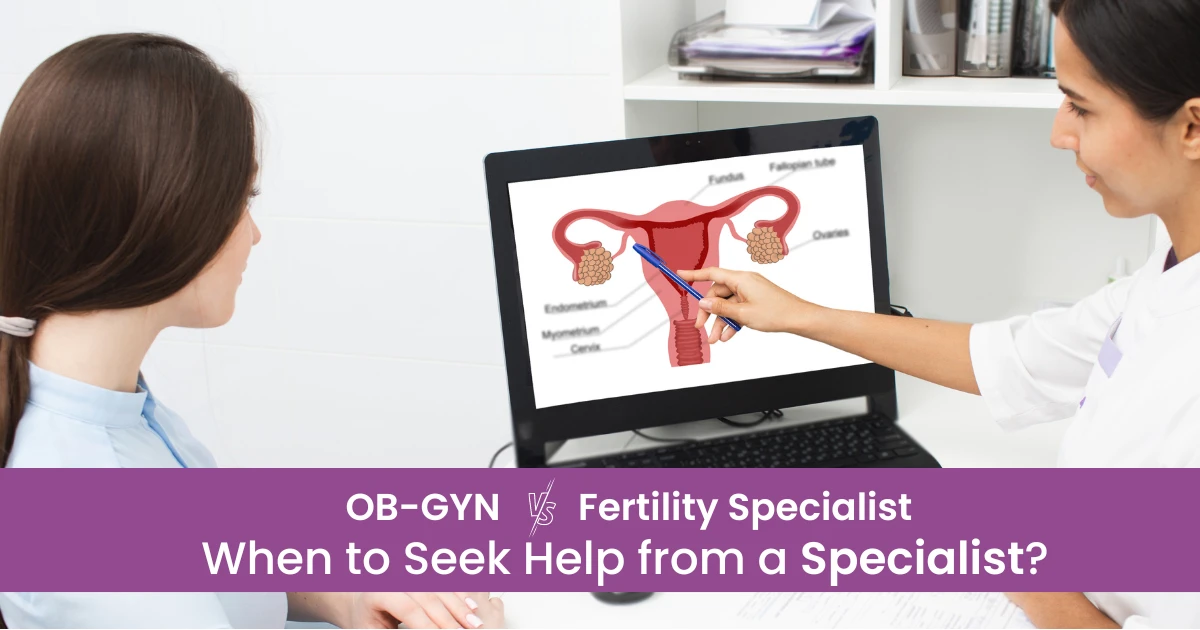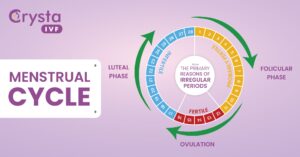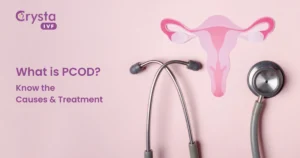Starting a family is a major milestone in many people’s lives, but for some couples, it can be a challenging and frustrating journey. When addressing infertility issues, people typically consult two types of doctors: obstetrician-gynecologists OB-GYN and fertility specialist.
While both types of doctors specialize in women’s reproductive health, they have different areas of expertise.
In this blog, we’ll explore the difference between OB-GYNs and fertility specialists and why and when you might consider leaving your OB-GYN for a fertility doctor.
Whether you’re just starting to think about starting a family or you’ve been trying for a while without success, understanding your options and finding the right doctor can make all the difference.
OB-GYN vs. Fertility Specialist
When it comes to reproductive health, there are two types of doctors women want to seek: OB-GYNs and fertility specialists.
An OB-GYN is an abbreviation for obstetrician-gynecologist; they are trained to provide general care for women, including gynecological exams, contraception, and prenatal care. They may also provide some essential fertility treatments, such as prescribing ovulation-inducing medications. If you’re seeking guidance for a healthy pregnancy, you may seek out OB-GYNs.
On the other hand, fertility specialists are experts in diagnosing and treating infertility. If you’re experiencing difficulty conceiving, you may seek a fertility doctor. They may use advanced techniques such as in vitro fertilization (IVF), intracytoplasmic sperm injection (ICSI), or intrauterine insemination (IUI) to help couples conceive.
While OB-GYNs can provide some fertility care, fertility specialists have a more specialized focus and may be better equipped to handle complex cases. Women must consult with both types of doctors to ensure they receive the best care for their reproductive health needs.
| OB-GYNs | Fertility Specialist | |
| Specialization | A medical doctor specializes in women’s general health and wellness. | A medical doctor with specialized training in reproductive medicine. |
| Focus | Trained to diagnose, treat, and manage various conditions related to the female reproductive system. | Focuses on infertility and other reproductive problems. |
| Diagnosis | May also perform routine surgeries such as hysterectomies or uterine fibroid removal. | A fertility specialist focuses primarily on diagnosing and treating infertility. |
| Treatment offered | Prescribe medications to help regulate hormones and improve fertility. | Provide more advanced treatments like intrauterine insemination (IUI) or in vitro fertilization (IVF). |
| Fertility Care | An OB-GYN can provide care throughout all stages of a woman’s reproductive life. | Typically only provides care related to reproductive health. |
When to Leave Your OB-GYN and See a Fertility Specialist?
When it comes to fertility, it is important to understand when to see a specialist. For most women, the first stop should be their OB-GYN. Your OB-GYN can provide regular checkups and help you understand your reproductive health.
While your OB-GYN is an excellent resource for basic fertility care and can provide advice on preconception health and the timing of intercourse, sometimes it takes a fertility specialist to help you conceive.
Generally, it is recommended that couples seek a fertility specialist‘s help after one year of trying to conceive if the woman is under the age of 35. Fertility specialists are trained in diagnosing and treating infertility and have access to advanced technology that can help identify any potential issues.
They can also advise on lifestyle changes that may help improve your chances of conceiving.
Here are some common reasons why couples may consider seeking the expertise of a fertility specialist.
6 Reasons You May Want to See a Fertility Doctor
1. You’ve been trying to conceive for over a year: Generally, women should consider seeing a fertility specialist if they have been trying to conceive for more than one year (or more than six months if they are over 35).
2. Irregular menstrual cycles: Irregular menstrual cycles can make it difficult to predict ovulation and may be a sign of an underlying fertility issue.
3. Male factor infertility: Male infertility accounts for approximately 40% of infertility cases. A fertility specialist can evaluate male factor infertility and recommend appropriate treatments.
Read more: Which Doctor Should You Consult For Male Infertility?
4. Underlying medical condition: If you have any underlying medical issues affecting your fertility, such as endometriosis or polycystic ovarian syndrome, you should also consider seeing a fertility specialist.
5. Age: Women’s fertility declines with age, and it’s essential to seek help sooner rather than later if you’re over 35 and to try to conceive. A fertility doctor can help you understand your options and provide guidance on the best course of action.
6. Previous reproductive issues: If you’ve had a previous miscarriage or stillbirth, you must see a fertility doctor to determine if any underlying causes need to be addressed.
Takeaway: Pay attention to your body and seek suitable medical attention regarding your reproductive health. Also, if you have been trying to conceive for a while without success, consider seeing a fertility specialist.
While OB-GYNs are highly trained medical professionals, fertility specialists have specialized training and expertise in treating fertility issues.
The decision to see a fertility specialist might be difficult, but it is essential to remember that you are not alone and that resources are available to help you.
If you struggle to conceive, do not hesitate to consult highly experienced fertility specialists at Crysta IVF, the best IVF Clinic in Delhi. The medical professionals at Crysta IVF have years of experience and expertise in treating fertility issues. You can make your parenthood dream a reality with the right care and support.
Also Read: Gynecologist: When to Visit and What to Expect?




